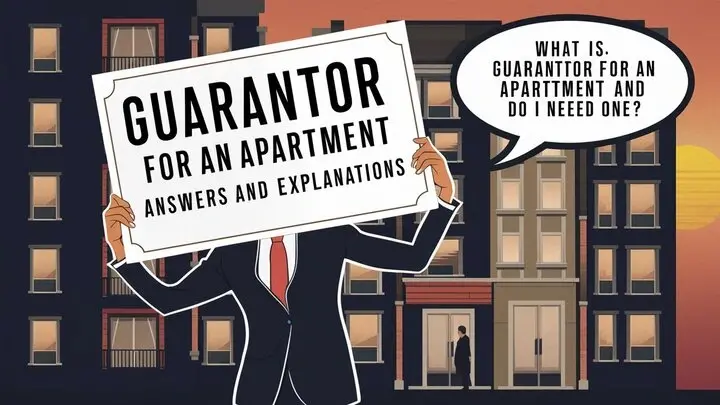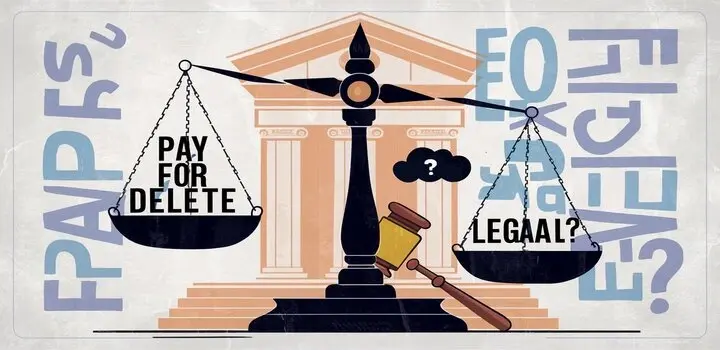-
Posted on: 28 Jun 2024

-
Securing an apartment can be a significant step, but sometimes landlords require more than just your good word and a promising application. Enter the guarantor. Understanding what a guarantor is, their role, and whether you need one is crucial for navigating the rental process smoothly. This comprehensive guide will break down everything you need to know about apartment guarantors, helping you determine if you require one and how to find one if necessary.
Understanding the Role of a Guarantor
A guarantor, also sometimes referred to as a co-signer, acts as a financial safety net for your landlord. Essentially, they are a third party who agrees to be responsible for your rent payments and any damages to the property if you, the tenant, fail to fulfill your obligations under the lease agreement.
Think of it this way: the landlord is taking a risk by renting to you. They want assurance that they'll receive their rent on time and that their property will be maintained. A guarantor provides this assurance, especially if your financial situation or rental history raises concerns.
Key Responsibilities of a Guarantor
- Rent Payment: The primary responsibility is to cover the rent if the tenant defaults.
- Damage Coverage: They are liable for the costs associated with any damages to the apartment beyond normal wear and tear.
- Lease Adherence: While not directly involved in the day-to-day tenancy, they are ultimately responsible for ensuring the lease terms are upheld.
- Legal Recourse: Landlords can pursue legal action against the guarantor to recover unpaid rent or repair costs.
Do You Need a Guarantor? Common Scenarios
Whether or not you need a guarantor depends on a variety of factors related to your financial profile, rental history, and the specific requirements of the landlord or property management company. Here are some common situations where a guarantor is often required:
1. Insufficient Credit History
A strong credit history is a key indicator of financial responsibility. If you have a limited credit history, such as if you're a young adult renting for the first time, or if you have a poor credit score due to past financial difficulties, a landlord may require a guarantor.
Landlords typically look for credit scores above a certain threshold, often in the 650-700 range or higher. A lower score signals a higher risk of missed payments, prompting the need for a guarantor.
2. Low Income
Landlords generally want to see that your income is sufficient to comfortably cover the monthly rent. A common rule of thumb is that your gross monthly income should be at least three times the rent amount. If your income falls short of this requirement, a guarantor can provide the necessary financial backing.
Even if you meet the income requirement, a landlord might still request a guarantor if your income is unstable or comes from sources that are considered less reliable, such as freelance work or irregular part-time jobs.
3. Student Status
Students often lack the established credit history and consistent income that landlords seek. As a result, students are frequently required to have a guarantor, typically a parent or other close relative.
Many apartment complexes located near universities and colleges are specifically geared towards student renters and have streamlined processes for handling guarantor applications.
4. Recent Job Change or Relocation
If you've recently started a new job or moved to a new city, you may not have a long enough employment history or established financial stability in the area to satisfy a landlord. In such cases, a guarantor can provide reassurance.
Landlords often want to see proof of stable employment for at least six months to a year. A guarantor can bridge the gap while you build your employment history in your new location.
5. Limited Rental History
A positive rental history, including on-time rent payments and no evictions, is a significant factor in a landlord's decision. If you're a first-time renter or have gaps in your rental history, a guarantor can help you secure an apartment.
Landlords typically verify rental history by contacting previous landlords. Without a solid rental history, a guarantor offers an alternative form of assurance.
Guarantor Requirements: What Landlords Look For
Just like tenants, guarantors must meet certain criteria to be approved. Landlords need to be confident that the guarantor has the financial capacity to cover the rent and any potential damages. Here's what they typically look for:
1. Credit Score
A guarantor's credit score is a primary indicator of their financial responsibility. Landlords generally require a higher credit score for guarantors than for tenants, often in the 700-750 range or higher.
A strong credit score demonstrates a history of responsible borrowing and repayment, giving the landlord confidence that the guarantor will be able to meet their obligations.
2. Income
Guarantors must demonstrate a stable and sufficient income to cover both their own living expenses and the tenant's rent if necessary. The income requirement for a guarantor is typically significantly higher than the requirement for a tenant alone. Landlords often require a guarantor's annual income to be four to six times the annual rent.
Proof of income is usually required, such as pay stubs, tax returns, or bank statements.
3. Employment History
A stable employment history is another important factor. Landlords prefer guarantors who have been employed in the same job or industry for a significant period of time, demonstrating consistent income and financial stability.
4. Residency
Many landlords prefer guarantors who reside in the same state or region as the rental property. This makes it easier to pursue legal action if necessary.
Some landlords may have stricter residency requirements, requiring guarantors to live within a certain radius of the property.
5. U.S. Citizenship or Permanent Residency
In most cases, landlords require guarantors to be U.S. citizens or permanent residents to ensure legal recourse is available if needed.
Finding a Guarantor: Your Options
If you need a guarantor, your first step is usually to ask a close family member, such as a parent, sibling, or grandparent. However, if that's not possible, here are some alternative options:
1. Family Members or Close Friends
This is the most common and often the most straightforward option. Talk to family members or close friends who meet the landlord's requirements and are willing to take on the responsibility. Explain the situation clearly and address any concerns they may have.
2. Professional Guarantor Services
Several companies specialize in providing guarantor services for a fee. These companies act as your guarantor, charging a percentage of the annual rent as a premium. This can be a good option if you don't have a personal contact who meets the requirements or is willing to act as your guarantor.
Research guarantor services carefully. Look for reputable companies with transparent fees and a proven track record.
3. Increased Security Deposit
In some cases, landlords may be willing to waive the guarantor requirement if you offer a significantly larger security deposit. This provides the landlord with additional financial protection in case of rent default or damages.
4. Prepaying Rent
Another option is to prepay several months of rent upfront. This demonstrates your financial commitment and reduces the landlord's risk, potentially eliminating the need for a guarantor.
5. Demonstrating Strong Financial Improvement
If your credit score has recently improved or your income has increased, provide documentation to the landlord to demonstrate your improved financial situation. This may be enough to convince them to waive the guarantor requirement.
The Guarantor Application Process
The guarantor application process is similar to the tenant application process. The guarantor will need to provide personal and financial information, including:
- Application Form: A completed application form with personal details and contact information.
- Credit Report: Authorization for the landlord to run a credit check.
- Proof of Income: Pay stubs, tax returns, or bank statements to verify income.
- Proof of Employment: A letter from their employer or recent pay stubs.
- Identification: A copy of their driver's license or other government-issued ID.
The landlord will review the guarantor's application and assess their creditworthiness and financial stability. If the guarantor is approved, they will need to sign the lease agreement, acknowledging their responsibility as a guarantor.
Legal Considerations for Guarantors
It's crucial for guarantors to understand the legal implications of their role. Here are some key considerations:
- Joint and Several Liability: In most cases, the guarantor is jointly and severally liable for the tenant's obligations. This means that the landlord can pursue the guarantor for the full amount of the debt, even if there are other tenants on the lease.
- Duration of Guarantee: The guarantee typically lasts for the entire term of the lease, including any renewals or extensions.
- Legal Action: Landlords can pursue legal action against the guarantor to recover unpaid rent or repair costs.
- Impact on Credit Score: If the tenant defaults on the rent and the guarantor is forced to pay, it can negatively impact the guarantor's credit score.
Before agreeing to be a guarantor, it's advisable to review the lease agreement carefully and seek legal advice if necessary.
Alternatives to Having a Guarantor
If finding a guarantor proves difficult, explore these alternative strategies to increase your chances of approval:
- Offer a Higher Security Deposit: Bolstering the security deposit demonstrates your commitment and offers the landlord extra financial protection.
- Pay Rent in Advance: Prepaying several months' rent showcases your financial stability and reduces the landlord's risk.
- Demonstrate a Strong Credit History: Highlight any recent improvements in your credit score or provide documentation of responsible financial behavior.
- Build a Strong Rental History: Obtain letters of recommendation from previous landlords to showcase your reliability as a tenant.
- Consider a Sublease (If Allowed): If allowed by the landlord, find a suitable subtenant to share the financial responsibility. This requires landlord approval.
- Look for Apartments with More Flexible Requirements: Some landlords are more lenient with their requirements, especially in areas with high vacancy rates.
Navigating the Apartment Search with Confidence
Understanding the role of a guarantor and your options can significantly streamline your apartment search. By being prepared, gathering the necessary documentation, and exploring alternative strategies, you can increase your chances of securing your dream apartment, even if you face challenges with credit history, income, or rental history. Remember to be proactive, transparent, and communicate openly with potential landlords to build trust and demonstrate your responsibility as a tenant.











